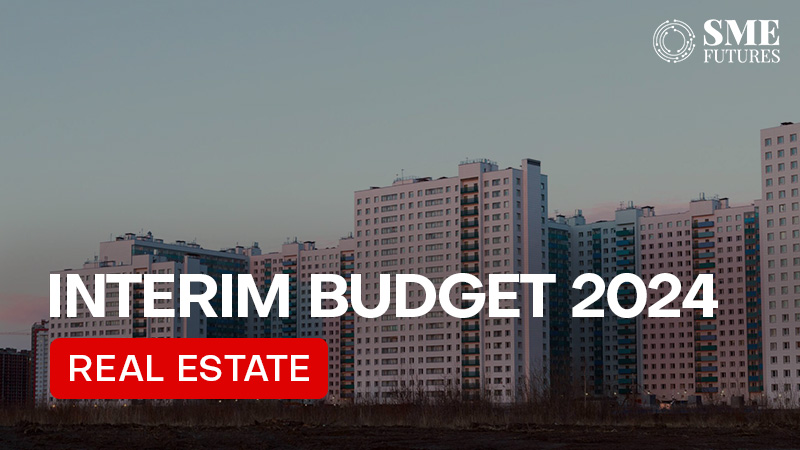As the Indian economy navigates through a dynamic phase, all eyes are now focused on the upcoming budget, with the real estate sector standing at the forefront of expectations. The stakeholders eagerly await measures that could potentially shape the future trajectory of this crucial sector.
Key themes emerging in the pre-budget discourse include demands for the granting of ‘industry status’ to real estate, demands for fiscal incentives, streamlined regulatory frameworks, and measures to boost consumer sentiment.
Also Read: What MSMEs want from budget 2024
Stakeholders are also looking for innovative policy interventions to address issues such as affordable housing, liquidity support for developers, and measures to stimulate demand.
Increase tax rebate slabs and other tax reforms
Sandeep Runwal, President of NAREDCO suggests “an increase in the cap for interest rate deduction under section 24(b) from Rs 2 lakhs to Rs 5 lakhs per annum.”
He adds, “The industry also anticipates the continuation of incentives for affordable rental housing schemes. Tax reliefs for such projects could accelerate investment and aid in achieving the Government’s ambitious ‘Housing for All’ goal. Further expectations include tax benefits for first-time homebuyers and the re-introduction of GST with an input tax credit on under-construction properties. These measures are anticipated to stimulate demand among homebuyers.”
Other suggestions include tax reliefs to fuel significant growth in the real estate sector, single window clearance, and reduced home loan interest rates. The reintroduction of subvention schemes is also on the wish list, which would assist homebuyers in aligning their payments and encourage home-buying decisions.
Addressing metro city property rates and expanding the SWAMIH fund
Pritam Chivukula, Co-Founder & Director, Tridhaatu Realty puts forth his demands. “We hope for a call to redefine the definition of affordable housing, proposing an increase in the cap from Rs. 45 lakhs to Rs. 1 crore, particularly in metro cities. This change is expected to boost both affordable and mid-segment housing significantly,”
“An expansion of the SWAMIH Fund is proposed to ensure the timely completion of stressed projects. This will not only assist developers but also reinforce homebuyer confidence by delivering projects on schedule.” he added.
Industry status recognition
Rohan Khatau, Director, CCI Projects Private Limited remarked, “The sector’s long-standing request for recognition as an ‘Industry’ remains a focal point. This status could enable the sector to attract equity investments, restructure debts, and secure loans at more favourable interest rates.
Need for renewed and extended benefits
Aakash Patel, Director of Atul Projects India Pvt. Ltd. shares his anticipation, “The Indian government’s strategic reforms, aimed at revitalizing the economy, have infused the market with liquidity, showing promising long-term economic benefits. These measures have painted an optimistic picture of India’s economic prospects in the years ahead.”
However, the expiry of several incentives for developers and consumers in the past one to two years has highlighted the need for renewed and extended benefits. Critical measures, such as tax breaks for affordable housing development and acquisition, are seen as crucial for the sector’s continued vitality.
As a major driver of the Indian economy, the real estate sector stands at a crucial juncture. The government is expected to announce measures in the upcoming budget that will not only attract foreign investments but also contribute significantly to job creation, further cementing the sector’s role in India’s economic expansion.
Realising the ‘Housing for All’ dream
Himanshu Jain, VP – Sales, Marketing & CRM, Satellite Developers highlights the importance of real estate sector, “Following agriculture, the real estate sector stands as the second largest employer in India, contributing significantly to the nation’s economy with approximately 9-10 per cent of the total GDP.
The industry is appealing for a robust government package aimed at alleviating the severe demand shortage. Their proposal includes relief measures for homebuyers, particularly in the pricing domain, to stimulate the market.”
The government’s initial steps, notably the Pradhan Mantri Awas Yojana (PMAY), were directed at addressing the acute housing shortage, which has led to the proliferation of slums and shanties in urban and semi-urban areas. Presently, the Centre is considering proposals to reduce the costs of under-construction properties. This initiative aims to ensure developers pass on the benefits of input tax credits to homebuyers, a practice that has seen limited compliance despite governmental appeals.
The upcoming budget session is particularly significant, with the real estate sector keenly anticipating measures that will offer relief to potential homebuyers, especially in metropolitan cities like Mumbai.
Other miscellaneous expectations
Samyak Jain, Director of Siddha Group said, “In anticipation of the 2024-25 budget, there is a growing sentiment of optimism within the real estate sector, which is expected to be a significant benefactor of the new fiscal policies. After a year of remarkable performance, the industry emphasises the need for additional support to maintain this growth trajectory.
The industry is hopeful for an upward revision of the cap in the credit link subsidy scheme, along with the introduction of tax benefits for first-time homebuyers. Such measures are seen as pivotal in sustaining the sector’s momentum.
The government’s efforts in promoting affordable housing have been acknowledged and appreciated. However, there is a need for further enhancements.”
The sector also recognises the shifting demographics, with a constant influx of people from smaller cities into metropolitan regions. This demographic change escalates housing demands, necessitating timely government intervention to capitalise on the projected upward trend in the real estate sector. The forthcoming budget is viewed as a crucial opportunity to address these needs and propel the sector towards sustained growth.
The impending budget holds the potential to reshape India’s real estate landscape. The sector anticipates pragmatic policies to address challenges and fuel growth. As stakeholders await the unveiling, the budget’s impact on the real estate sector is poised to influence not just the industry but the broader economic recovery.











